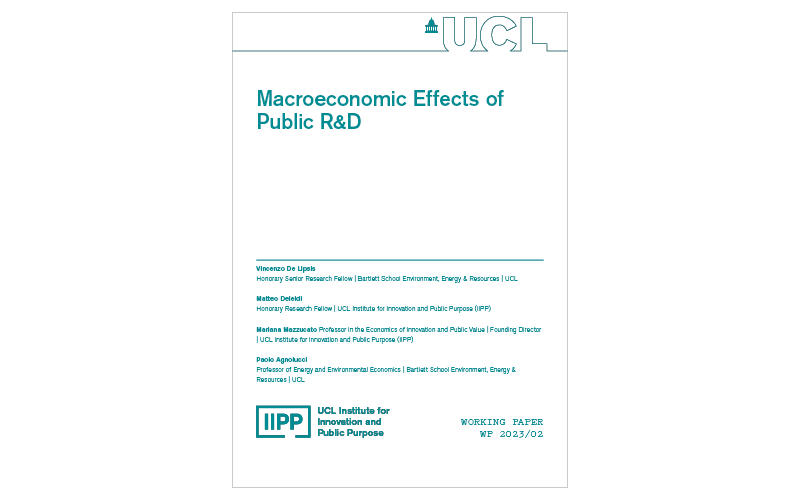Macroeconomic Effects of Public R&D
This paper explores the dynamic macroeconomic effects of government R&D investment and its potential to address the long-term challenges of modern society such as pandemics and climate change.

31 January 2023
UCL Institute for Innovation and Public Purpose (IIPP) Working Paper Series: IIPP WP 2023-02
Authors:
- Vincenzo De Lipsis | Honorary Senior Research Fellow | Bartlett School Environment, Energy & Resources | UCL
- Matteo Deleidi | Honorary Research Fellow | UCL Institute for Innovation and Public Purpose (IIPP)
- Mariana Mazzucato | Professor in the Economics of Innovation and Public Value Founding Director | UCL Institute for Innovation and Public Purpose (IIPP)
- Paolo Agnolucci | Professor of Energy and Environmental Economics | Bartlett School Environment, Energy & Resources | UCL
Reference:
De Lipsis, V., Deleidi, M., Mazzucato, M. and Agnolucci, P. (2023) Macroeconomic Effects of Public R&D. UCL Institute for Innovation and Public Purpose, Working Paper Series (IIPP WP 2023-03). https://www.ucl.ac.uk/bartlett/public-purpose/wp2023-02.
Abstract:
The direct public funding of R&D investment to stimulate technological innovation has a strong theoretical case and has gained renewed attention in the recent policy debate as a way to address the long-term challenges of modern society such as pandemics, climate change, and the transition to a low-carbon economy. We estimate the dynamic macroeconomic effects of government R&D investment and we find that it is very effective in fostering the total national innovation effort, crowding in private R&D investment, and in raising aggregate output in the long run. We also find that the public stimulus goes beyond private R&D activities and involves a very strong expansion of overall economic activity since the early periods. Finally, we uncover a strong positive impact of the private sector’s anticipation of public R&D spending, which can be interpreted as a confirmation of the importance of managing expectations to reduce the uncertainty inherent to R&D activities.
 Close
Close

